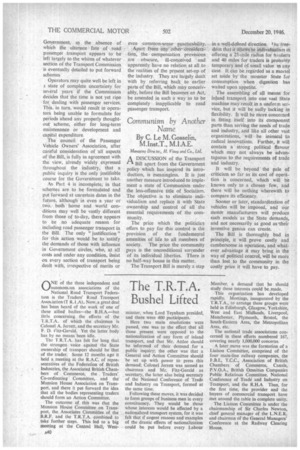Communism by Another Name
Page 42

If you've noticed an error in this article please click here to report it so we can fix it.
By C. Le M. Gosselin, M.1.A.E.
Mcmaoing Dire( tor, H. Vine,' and Co., Ltd.
A DISCUSSION of the Transport
Bill apart from the Government policy which has inspired its introduction, is meaningless. It is just another measure introduced to implement a state of Communism under the less-offensive title of Socialism. The objective is to eliminate individualism and replace it with State ownership and control of all the essential requirements of the community.
The price which the politician offers to pay for this control is the provision of the fundamental amenities of life to all members of society. The price the community pays is the unconditional surrender of its individual liberties. There is no half-way house in this matter.
The Transport Bill is merely a step in a well-defined direction. I he freedom that it allows to individualism in offering a 25-mile radius for hauliers and 40 miles for traders is probably temporary and of small value m any case. It can be regarded as a morsel set aside by the monster State for consumption when digestion has waited upon appetite.
The assembling of all means for inland transport into one vast State machine may.result in a uniform service, but it will be sadly lacking in flexibility. It will be more concerned in fitting itself into its component parts than serving the needs of trade and industry, and like all other vast organizations, will be inimical to radical innovations. Further, it will contain a strong political flavour which may not always be advantageous to the requirements of trade and industry.
It will be beyond the pale of criticism so far as its cost of operation is concerned, which will be known only to a chosen few, and there will be nothing wherewith to compare its efficiency.
Sooner or later, standardization of vehicles will be imposed, and our motdr manufacturers will produce such models as the State demands, and not necessarily as good as 'their inventive genius can create.
The Bill is thoroughly bad in principle, it will prove costly and cumbersome in operation, and whatever advantage it may bring in the way of political control, will be more than lost to the community in the costly price it will have to pay.




































































